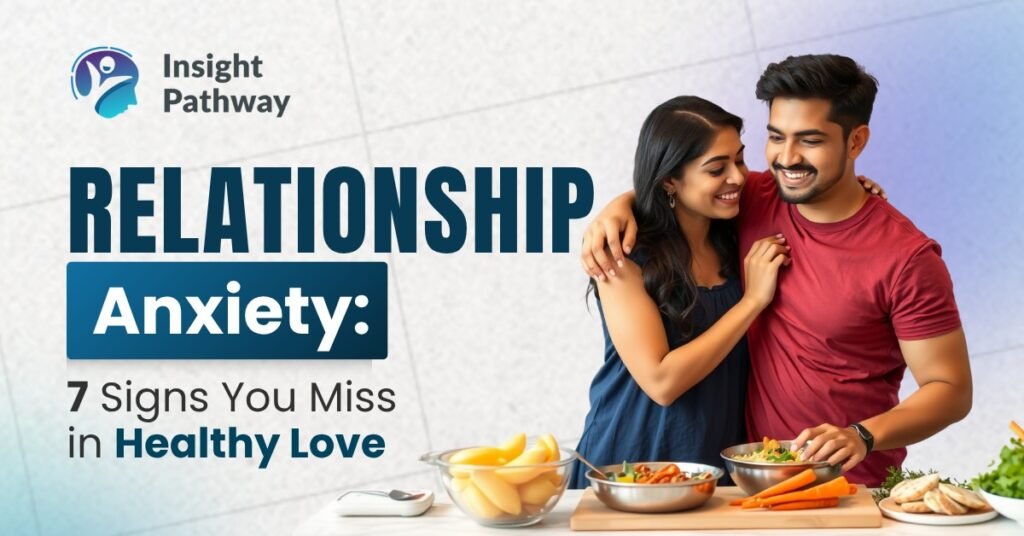Many people assume anxiety in relationships is a red flag a sign that something is wrong. But what if your anxiety shows up when everything is going right? You feel supported, your partner is kind, and yet, you constantly question the connection. This is the confusing reality of relationship anxiety.
It’s the fear that love might disappear without warning. It’s the unease that creeps in after a perfectly normal text message or a missed call. This kind of anxiety doesn’t always shout; sometimes, it whispers quietly beneath the surface, disrupting even the healthiest relationships.

What Is Relationship Anxiety?
Relationship anxiety is a pattern of persistent worry, doubt, or fear related to romantic connections. It often stems from emotional experiences in early life, such as inconsistent caregiving, rejection, or abandonment. These emotional triggers can be reactivated even in stable, loving relationships.
You may ask yourself:
- Do they really love me?
- What if they leave?
- Am I too much?
These thoughts can become overwhelming, making it hard to feel secure even when your partner gives you no reason to worry.
Why Does It Happen in Healthy Relationships?
It’s common to associate anxiety with chaos, conflict, or neglect. But many people feel anxious in emotionally safe relationships, too. In fact, healthy love can trigger anxiety because it contrasts with the emotional chaos you’re used to. When you finally receive stability, your brain may not know how to respond.
This can activate old survival mechanisms:
- Waiting for the “other shoe to drop”
- Questioning if love is real or conditional
- Believing you’ll be rejected once you’re truly seen
Without awareness, these feelings can quietly damage an otherwise healthy connection.
7 Subtle Signs of Relationship Anxiety
1. Overthinking Small Interactions
You mentally relive discussions, questioning whether you said something incorrectly. A delayed response or a slightly different tone can send your thoughts spiraling.
2. Constantly Needing Reassurance
You ask for repeated confirmation:
“Are we okay?”
“Do you still love me?”
This often feels calming short-term but increases long-term anxiety.
3. Avoiding Vulnerability
You fear being too emotional, too honest, or too needy. Instead of expressing yourself, you suppress your feelings to avoid seeming “difficult.”
4. Fear of Abandonment
You may become hyper-alert to signs that your partner might leave, even when they’ve shown commitment. This fear of abandonment can lead to emotional exhaustion.
5. Comparing Your Relationship to Others
Social media becomes a measuring stick. You wonder if your relationship is “as affectionate” or “as happy” as what others seem to show online.
6. Self-Sabotaging Behavior
You only push your lover away when things are pleasant. Picking unnecessary fights, withdrawing emotionally, or questioning the relationship can be signs of self-sabotage rooted in anxiety.
7. Difficulty Trusting Even When It’s Safe
Despite no clear red flags, you find it hard to fully relax. You could be reticent, find it difficult to trust, or be afraid of approaching too closely.
What Causes Relationship Anxiety?
Relationship anxiety doesn’t appear out of nowhere. Some common emotional roots include:
- Inconsistent caregiving during childhood
- Past relationships with betrayal or emotional manipulation
- Low self-worth or fear of not being “enough”
- Growing up in environments where love felt conditional or unsafe
When these emotional scars remain unhealed, they can appear suddenly in adult relationships.
How to Cope with Relationship Anxiety
1. Acknowledge the Pattern
Understanding when relationship anxiety is occurring is the first step towards resolving it. Practice naming your thoughts:
“This is anxiety, not reality.”
2. Regulate Your Nervous System
Use grounding techniques like breathwork, journaling, or a short walk to calm physical symptoms of anxiety. Emotional triggers often live in the body.
3. Strengthen Self-Trust
You will rely less on external validation the more you believe in yourself. Build your inner foundation with self-care practices, boundaries, and honest reflection.
4. Communicate Authentically
Share your feelings with your partner using “I” statements:
“I notice I feel anxious when I don’t hear from you all day. It helps me feel grounded to check in.”
Healthy relationships make space for emotional honesty.
5. Consider Professional Support
If relationship anxiety is interfering with your connection, therapy can help uncover its roots and develop healthier emotional patterns. You don’t have to do it alone, and healing is achievable.
Conclusion
You can feel anxious and still be in the right relationship. The presence of anxiety doesn’t always mean something’s wrong with your partner sometimes, it means your past is asking to be healed.
By learning to spot the signs of relationship anxiety, you take the first step toward deeper self-awareness and emotional freedom. Love isn’t about being perfect or always confident it’s about being real, open, and willing to grow.
You deserve a relationship where you feel calm, secure, and seen. Healing your inner world is the first step on the path to that type of love.


